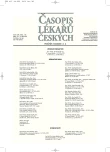-
Medical journals
- Career
Milestones of Cardiovascular Pharmacotherapy: II. Digitalis
Authors: P. Jerie
Published in: Čas. Lék. čes. 2007; 146: 314-320
Category: Review Article
Overview
Several plant extracts containing cardiac glycosides have been used in the treatment of dropsy (oedemas) for many centuries. When William Withering 1785 published his book „An account of the foxglove and some of its medical uses“, he was aware that digitalis is effective only in certain medical forms of dropsy but did not associate this effect with the cardiac action of the drug. However, he recognised that „the motion of the heart was affected“. Although clinical experience, experimental data and haemodynamic studies supported the use of digitalis for the treatment of heart failure, repeated controversies surrounded its efficacy and appropriated indication. At the end of the last century, the issue was not whether digoxin is effective, but whether it has a role in patients with sinus rhythm treated with ACE-inhibitors and in heart failure with preserved systolic function. In 1993, two studies that assessed the effect of digoxin withdrawal noted adverse effects after discontinuation: In the RADIANCE Study, digoxin withdrawal was associated with significant worsening of heart failure and decrease in exercise capacity and LVEF, and the PROVE Trial provided strong evidence of digoxin efficacy in patients with systolic dysfunction and sinus rhythm. In the DIG Study (1997) digoxin reduced the rate of hospitalisations but did not significantly improve the survival. The reevaluation of this study by Ahmed et al. (2006), however, demonstrated that digoxin reduces mortality and hospitalisation rate in all patients including those with preserved systolic function if used in doses of 0,125–0,250 mg reaching the SDC of 0,5–0,9 ng/ml. The authors conclude that digoxin should be prescribed before adding ACE-inhibitors, angiotensin receptor blockers, aggressive diuretic therapy and before considering cardiac resynchronisation therapy, thus rehabilitating the physiological approach to the treatment of chronic heart failure, starting the treatment by restriction of physical activity and digitalis, as practised before introduction of oral diuretics, and newly suggested by Braunwald 1980. It is a logical inexpensive approach.
Key words:
digoxin, digitalis, cardiac glycosides, digitalis controversy, chronic heart failure, William Withering.
Labels
Addictology Allergology and clinical immunology Angiology Audiology Clinical biochemistry Dermatology & STDs Paediatric gastroenterology Paediatric surgery Paediatric cardiology Paediatric neurology Paediatric ENT Paediatric psychiatry Paediatric rheumatology Diabetology Pharmacy Vascular surgery Pain management Dental Hygienist
Article was published inJournal of Czech Physicians

-
All articles in this issue
- Decompressive Craniectomy in the Treatment of Posttraumatic Edema and the Contribution of new Diagnostic Methods
- Milestones of Cardiovascular Pharmacotherapy: II. Digitalis
- Perioperative Betablockade
- Adjuvant Chemotherapy in the Treatment of Non-small Cell Lung Cancer
- Phytosterols as a Functional Food
- Genotype – Disease Association and Possibility to Reveal Environmentally Modifiable Disease Causes: The Use of Mendelian Randomization Principle
- How to Continue in the Treatment of Tuberculosis in the Czech Republic?
- Factors Modulating Parameters of Cholesterol Homeostasis in the Metabolic Syndrome
- Relation Between Alcohol Intake and Some Metabolic and Cardiovascular Risk Factors in the Healthy Men
- Practical Aspects and Clinical Value of t(14;18) Monitoring in Peripheral Blood of the Follicular Lymphoma Patients
- Effect of Surgical Treatment of Atrial Fibrillation on the Attainment and Maintenance of Sinus Rhythm in Patients Undergoing Concomitant Cardiac Surgery – Short-term Results
- The Use of Thrombelastography in Evaluation of Coagulation in Females with Physiological or Pathological Gravidity
- The Use of Paracetamol in Children –Benefits and Risks
- Indication to Occlusion of Patent Foramen Ovale in Patient with Pulmonary Hypertension after a Cardioembolic Stroke
- Journal of Czech Physicians
- Journal archive
- Current issue
- Online only
- About the journal
Most read in this issue- Adjuvant Chemotherapy in the Treatment of Non-small Cell Lung Cancer
- Indication to Occlusion of Patent Foramen Ovale in Patient with Pulmonary Hypertension after a Cardioembolic Stroke
- Phytosterols as a Functional Food
- The Use of Paracetamol in Children –Benefits and Risks
Login#ADS_BOTTOM_SCRIPTS#Forgotten passwordEnter the email address that you registered with. We will send you instructions on how to set a new password.
- Career

